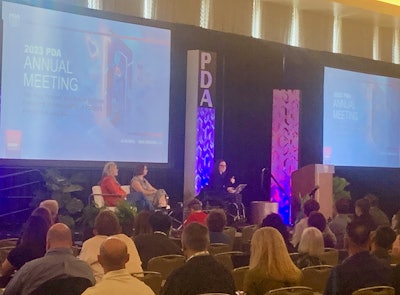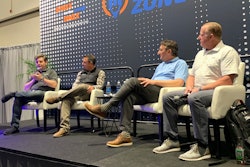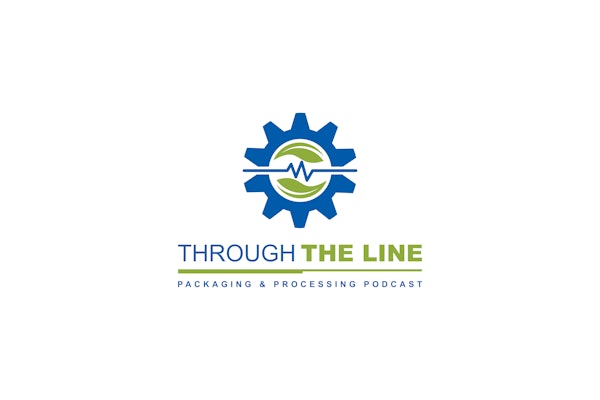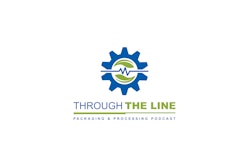At the PDA Annual Meeting this week in New Orleans, attendees had the chance to hear from EveryLife Foundation executive director and leader of a number successful initiatives, Julia Jenkins, on the economic impact of rare disease in the U.S. and Kelly Baker, a member of the Young Adult Rare Representatives (YARR) group, on her perspective as a patient living with a rare disease and using home parenteral nutrition (HPN). Baker discussed a number of ways that her diagnosis of chronic intestinal pseudo-obstruction (CIPO) has changed her life, and how HPN allows her not only to survive but to thrive as a current nursing student, summer camp counselor for children with special needs, and more.
In a highly detailed Q&A session, audience members asked the duo about actions manufacturers and individuals can take, how patients manage drug shortages, the role of AI, and more. [Editor’s note: some answers have been edited for length.]
Q: What can manufacturers do to ease rare disease patients’ burdens in the meantime while someone is (hopefully) out there seeking a cure?
Kelly Baker: In manufacturing, I think the biggest issue is supply shortages for a lot of us. In the last 10 years, there hasn’t been one time when all parenteral nutrition products have been in adequate supply at once. I think that's led to a lot of issues for many of us—even before COVID shortages—in the last 10 years. I personally have gone without medications because they weren't available or have gone without tubing for a certain pump because it wasn't available, so I had to switch to bigger pumps that were only on IV poles, or ones that weren't as easily carried around. But especially going without medications, that's been the biggest issue for us.
Julia Jenkins: We can’t fix all of these problems without partners that are in the space doing the work. We can work towards solutions together, but if we don't understand the challenges that are happening at the factories that are making these [products experiencing shortages] happen, we can't change and fix that with public policy. That's why I really invite all of you to engage and work on policy solutions and regulatory solutions with us so that we can ensure patients get access to what they need.
Q: In regard to the extremely challenging patient odyssey in getting a diagnosis, do you think we're looking at changing the way we educate doctors?
Jenkins: Kelly and I were actually having a chat before this panel… her own patient organization has a conference, but then they have a completely separate conference for the medical clinicians. Wouldn't it be powerful if those conferences were together where the clinicians were actually getting to engage with patients on a more social level and really understanding what their journey is? I think that a lot of times there's a missed perception of what the disease symptoms are, because what's described in a book might not be what the patients are experiencing, and that's going to cause the delay in diagnosis if you don't fit what is in their definition in the book.
The more that we can engage the patients in every table and every process, the more we can start changing those perceptions because, unfortunately, there are horror stories: children being taken away from parents where they believe the parents are abusing them, or that people are considered to have a mental health issue because they aren't believed. I think we have to start believing patients and we have to remove the burden from the rare disease patient of having to get their own diagnosis. Because in the rare disease community, every step in the process falls on a patient—they have to get their own diagnosis; they have to start their own nonprofit; they have to fundraise, start a GoFundMe to fund basic research; start their own registry; and they have to convince a drug company to develop a treatment or even start their own. We don't believe patients should have to start their own drug company to save themselves or save their child.
Q: The Parenteral Drug Association has been working with the FDA and companies to eliminate drug shortages. Kelly, what do you do when there's a drug shortage? This is your life saving combo and sometimes drugs might be on shortage for months, if not maybe years. How do you manage through that?
Baker: Fortunately, [my pharmacist] is very helpful in navigating these things. Specifically, the medications I've been on that were short are things that usually can be replaced. There's been some things that such as protein or copper additives into the TPN [total parenteral nutrition] that they had to replace with other brands, or were only doing every other day, so that I was still getting enough to live off of—kind of rationing it—but it wasn't as much as I was getting [prior to the shortage].
For some things I had an acceptable replacement, but for me, I had a bit of a different reaction to it, and it just doesn't work quite as well. I had IV nausea meds that were out, so I had to switch those over to oral medications, which just don't work very well when you're vomiting. So fortunately for me, everything's been able to be replaced with other things, it was more of an inconvenience. But I know there are patients who have lost access to life-saving medication and there just really wasn't any other option but to go back to their provider and go back to palliative care.
Q: Again around the patient odyssey that many people go through to get a diagnosis, it seems to be a lot of human error in the process where professionals and doctors veer into the excuse, "It's all in your head.” Can technology assist this decision-making or what is in progress for guiding this journey?
Jenkins: I want to caution billing technology as the solution. First of all, there’s great diagnostic technology out there. But it does not diagnose people—people diagnose people. We have a worker shortage of genetic counselors in this country, we have worker shortages for specialists in this country. If you are in a room with this many patients [gestures to audience], and you ask them “how many people here have a physician of over the age of 60?” you’re getting 90% of the room for raising their hands. What are we doing to usher in the next generation of specialists? How many people have ever met a genetic counselor of color? What does that mean for our communities of color if they don't see a physician or a genetic counselor that looks like them? What's the trust going to be with that person?
I think there's a lot of exciting technology like AI coming out, there's exome sequencing and panel sequencing that's happening. But please don't think that we can use technology to solve this problem. We need to make sure that our system has enough physicians and genetic counselors to really treat patients and see patients and to give them not just their diagnosis, but what happens after the diagnosis. And that is something that diagnostic tests cannot do.
Q: We probably all have people we know who didn't make it while waiting for a treatment to be discovered. We look at how slow the U.S. government is to act. What do we have to do to unlock the progress? How do we get this ship moving faster? Because again, patients are waiting, patients are dying. So what do you need from us?
Jenkins: We need the FDA understand rare diseases, small clinical trial design… we need them to understand what the patients’ preferences are. I talked earlier about how slowing progression is actually success. In cancer, that's accepted by the FDA if it extends life by six months. But in rare, that level of acceptance—if it is accepted by the FDA—it’s not going to be accepted by payers. They'll cover a cancer drug, but not a rare disease drug.
I think we have to all work together to, again, elevate how rare is a public health crisis, how it's going to impact everyone. We need companies to care about rare. The Inflation Reduction Act that was passed by Congress was hugely detrimental to rare, but all diseases. We need to work together to correct that.
We have a reimbursement system that says that small molecules versus large molecules get different treatment under regulation. So companies are going to say, “Well, even though the best science and what the patients want is a small molecule drug, we won't develop that… we're going to go for a large molecule because they have better ability to return investment.” We cannot have policies that aren't actually facilitating science. So again, I think we all have to work together to make sure that our drug ecosystem really fosters science and innovation and doesn't create arbitrary policies that really hurt patients.
Q: I think part of the issue with physicians being reticent to really look into the rare diseases (a) there's not a lot to go on sometimes, (b) there's so prescriptive treatment, and you can't order tests or something, you don't have a diagnostic for, and (c) there's a fear of being sued. So is your organization doing anything specific or making any headway in this area, to at least help physicians have the courage to investigate some of these symptoms that patients are having?
Jenkins: Absolutely. We launched the ICD code roadmap because this is a challenge. There are very few ICD codes for our community. A lot of them get lumped into something like “mitochondrial-other”—there's no specific code. So we did create a roadmap for that.
But when you think about it… there is one child who couldn't even get hospice care because he didn't have diagnostic code. He is dying, so the physician gave him a code [for a diagnosis he didn't have] so that he could just get hospice. This is not a system that is going to work. And so yes, we are trying. It is complicated.
It is something that patients shouldn't have to do on their own. So we really encourage industry to partner with patient organizations, because they're going to need the industry funding because those are not cheap endeavors to go about. Ideally, we can fix it in the policy… we're working on that, but it is slow.
Q: What else can we do as individuals?
Jenkins: What you guys can do, if there's a conference that you attend, or that you're involved in, reach out to us. Kelly is amazing, and we have a couple dozen amazing people like Kelly, who hasn't even talked about her own experience lobbying Congress. She has some good stories of how she's talked to legislators.
But we want patients to be in the room. So if you're attending a conference and there's no patient speaker... if you think that patients should attend, we have a Rare Giving fund for travel reimbursement for patients to attend conferences. If you individually want to donate to that fund we welcome your contribution, because patients often have tons of medical expenses and can't just afford to attend conferences.
We're also looking for conferences to waive registration fees to allow patients to attend, because that was something that's also a barrier for people. So those are things just individually, if you're like, "Wow, this room could really benefit from the patient perspective," reach out to us, because it's not a legislative fix but we have killer patient advocates, we have funding that can help get patients there.
We are legislating the patient-focused drug development issue, and I think with that legislation, people are being more mindful. There was some legislation passed in the Omnibus Bill last year requiring early payer engagement with the FDA around right before the drug is approved, because there's a huge gap between FDA approval and when we get access to the drug. If we can shorten that timeline, not only does it help with market penetration, but it gives patients access to the drug sooner. Those are the things that we can look to legislate.
But you know, individually... we have an Action Center, and if you are a voter in the U.S., you can take action on our website on a number of policy issues impacting the rare disease community. You have a constitutional right to lobby the government and we welcome you and invite you to do so.






















